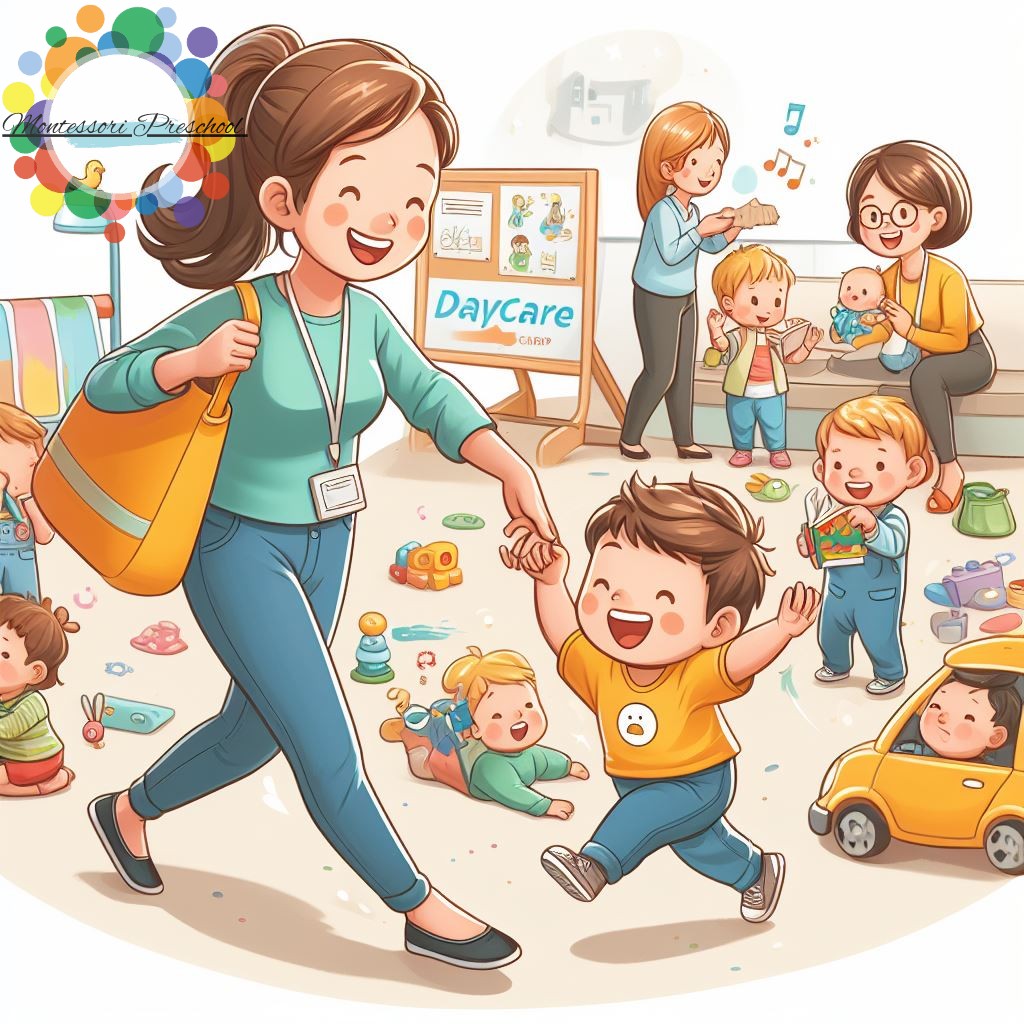
Deciding when to start daycare for a child is a personal decision that varies from family to family. While there is no universally agreed-upon worst age to start daycare, some parents and experts have concerns about starting daycare too early. In this article, we will explore the potential negative effects and risks associated with enrolling a child in daycare at a young age.
Negative Effects of Starting Daycare at an Early Age
Starting daycare at an early age can have various negative effects on a child’s development and well-being. Here are some potential consequences to consider:
Separation Anxiety
Starting daycare at a young age can trigger separation anxiety in children. They may find it challenging to cope with being away from their primary caregiver for extended periods. This anxiety can lead to behavioral issues, increased clinginess, and difficulty adjusting to new environments.
Weaker Immune System
Young children typically have weaker immune systems compared to older children and adults. Daycare environments often expose children to various germs and illnesses, increasing the likelihood of getting sick. This can result in frequent illnesses, leading to missed school days and added stress for both the child and their parents.
Reduced Parental Bonding
When a child starts daycare at a very young age, there is a possibility that the parent-child bonding may be affected. Spending less time with their primary caregiver can diminish the quality and quantity of bonding experiences, potentially impacting the child’s emotional development.
Developmental Delays
Some studies suggest a potential association between early daycare enrollment and developmental delays. These delays can manifest in areas such as language and cognitive skills, social and emotional development, and fine and gross motor skills. However, it is essential to note that these findings may not apply universally to all children.
Risks of Early Daycare Enrollment
Enrolling a child in daycare at a young age carries certain risks that parents should be aware of. Here are some potential risks associated with early daycare enrollment:
Limited Individualized Attention
Daycare centers often have a higher child-to-staff ratio, especially for infants and toddlers. With limited individualized attention, it can be more challenging for caregivers to cater to the unique needs of each child. This reduced attention can affect a child’s emotional and cognitive development.
Exposure to Inappropriate Behaviors
Young children are highly impressionable, and being in a daycare setting with older peers may expose them to inappropriate behaviors or language that they may imitate. This exposure can lead to the development of undesirable habits or attitudes.
Increased Stress
The transition to a daycare setting at a young age can be stressful for both the child and their parents. Young children may find it challenging to adapt to the structured routine and unfamiliar faces, leading to increased stress levels. Moreover, parents may experience guilt or anxiety about leaving their child in someone else’s care.
Lack of Cultural or Individual Beliefs Incorporation
Daycare centers often follow specific curricula and routines that might not align with a family’s cultural or individual beliefs. This lack of flexibility can create tension or conflict when parents feel that their child’s unique needs or values are not being adequately addressed.
Impact of Early Daycare on Child Development
Enrolling a child in daycare at a young age can have a notable impact on their overall development. It is important to consider the potential consequences and challenges that may arise:
Socialization Opportunities
One of the benefits of starting daycare at an early age is the increased exposure to socialization opportunities. Interacting with peers and caregivers can help children develop important social skills, such as sharing, empathy, and cooperation.
Cognitive Stimulation
Daycare environments often provide opportunities for cognitive stimulation through age-appropriate activities and interactions. This can contribute to the child’s cognitive development, language acquisition, and problem-solving skills.
Routine and Structure
Daycare centers typically follow a structured routine, providing children with consistent daily activities, including meal times, nap schedules, and playtime. This routine can help foster a sense of security and predictability for young children, aiding in their overall development.
Exposure to Diverse Experiences
Children in daycare are exposed to a diverse range of experiences and perspectives, which can broaden their understanding of the world. Interacting with children from different backgrounds and cultures can promote inclusivity and tolerance.
Disadvantages of Starting Daycare Too Young
Starting daycare at a very young age can have disadvantages that parents should be aware of. Here are some potential drawbacks to consider:
Lack of Individualized Attention
With a higher child-to-staff ratio in daycare centers, it can be challenging to provide individualized attention to each child, particularly for infants and toddlers. This may limit the level of personalized care and attention that a child receives.
Limited Family Bonding Time
Enrolling a child in daycare at a young age often results in reduced time spent with the family. Parents may feel a sense of loss or disconnection when they have less time to bond and participate in the early stages of their child’s development.
Potential Heavier Reliance on Caregivers
Young children who start daycare early may develop a stronger reliance on caregivers outside of their immediate family. This dependence may affect the child’s ability to self-soothe, problem-solve, and develop independence.
Higher Exposure to Illnesses
Daycare environments can expose young children to various germs and illnesses, increasing the frequency of illnesses they may experience. This can lead to increased medical expenses, missed work days for parents, and added stress for the family.
Consequences of Early Daycare Entry
Starting daycare at a young age can have consequences that parents should consider. Here are some potential outcomes associated with early daycare entry:
Emotional Adjustment Challenges
Young children may face emotional adjustment challenges when starting daycare at an early age. Separation anxiety, stress, and unfamiliarity with the new environment can impact their emotional well-being and overall adjustment.
Behavioral Changes
Transitioning to daycare at a young age can cause behavioral changes in some children. These changes may manifest as increased aggression, shyness, or withdrawal, as the child copes with the new environment and social dynamics.
Impact on Attachment
Early daycare enrollment can potentially affect the quality of attachment between the child and their primary caregiver. Spending less time together and relying on other caregivers can alter the attachment dynamics and influence the child’s sense of security.
Varied Developmental Outcomes
The impact of starting daycare at a young age can vary for each child. While some children thrive in a daycare setting and show positive developmental outcomes, others may experience difficulties or developmental delays. It is essential to consider the uniqueness of each child when making decisions about daycare enrollment.
Problems with Early Daycare Initiation
While daycare can provide numerous benefits for children and families, early initiation may present certain problems. Here are some potential challenges associated with starting daycare at a young age:
Limited Flexibility
Starting daycare early can reduce the flexibility of parents, as they need to adhere to specific drop-off and pick-up times. This can add pressure and constraints to their daily schedules, making it more challenging to juggle work and family responsibilities.
Cost Factors
Daycare expenses can be a significant financial burden for families, especially when starting at a young age. Early initiation may result in more years of daycare expenses, increasing the overall cost for parents.
Longer Adjustment Period
Young children may require a longer adjustment period when starting daycare early. It may take time for them to adapt to the new routine, caregivers, and social dynamics, resulting in a prolonged transition period.
Potential Disruption in Family Dynamics
Starting daycare too early can disrupt the established family dynamics, as parents and children adjust to a new routine and interact with additional caregivers. This adjustment period may require open communication and support from all family members.
Challenges of Starting Daycare at a Young Age
Starting daycare at a young age can present various challenges to both children and parents. Here are some common challenges associated with early daycare enrollment:
Separation Anxiety
Young children may experience separation anxiety when starting daycare, especially at a very young age. This emotional challenge can be difficult for both the child and their parents to navigate, requiring patience and support from daycare providers and family members.
Adjusting to New Social Environment
Entering a daycare setting at a young age means adjusting to a new social environment. For children who are not accustomed to being around peers for extended periods, this transition can be overwhelming and challenging.
Dealing with Behavioral Changes
Transitioning to daycare at a young age may result in behavioral changes, such as increased aggression, withdrawal, or clinginess. Parents need to understand that these changes are often temporary as children adapt to the new environment and social interactions.
Balancing Work and Family Life
Starting daycare early requires parents to navigate the challenges of balancing work and family life effectively. It may involve adjusting work schedules, finding reliable and flexible childcare options, and maintaining open communication with employers.
Drawbacks of Enrolling in Daycare Too Early
Enrolling a child in daycare at a very young age can have certain drawbacks that parents should consider. Here are some potential drawbacks to be aware of:
Limited Exposure to Family Culture
Starting daycare early can result in limited exposure to the child’s family culture and traditions. As children spend more time in a daycare setting, they may have fewer opportunities to participate in family rituals or activities that contribute to their cultural or individual identity.
Influence on Parent-Child Bonding
Enrolling a child in daycare at a young age may impact the parent-child bonding experience. Spending less time together can affect the depth and quality of the parent-child relationship, requiring intentional efforts to maintain closeness and connection.
Potential Stress for Children and Parents
Transitioning to daycare at an early age can be stressful for both children and parents. Children may struggle with adjusting to a new routine and environment, while parents may feel guilt or worry about their child’s well-being during daycare hours.
Increased Exposure to Illnesses
Children starting daycare at a young age may be more susceptible to illnesses due to their developing immune systems. Daycare environments can expose children to various germs and infections, increasing the likelihood of frequent illnesses and potential disruptions in the child’s routine.
Deciding on the appropriate age to start daycare is a personal decision that should consider the individual needs and circumstances of the child and their family. While there are potential negative effects and risks associated with early daycare enrollment, it is important to weigh them against the benefits daycare can provide, such as socialization opportunities and cognitive stimulation. Ultimately, parents should seek guidance from healthcare professionals and consider their child’s unique needs and developmental readiness before making a decision on daycare enrollment.



